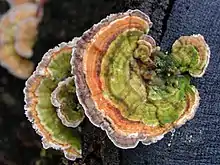Polysaccharide-K
Polysaccharide-K (Krestin, PSK) is a protein-bound polysaccharide isolated from the fruitbody of Trametes versicolor.

Research summary
PSK has been studied in patients with gastric cancer, breast cancer, colorectal cancer, and lung cancer. The US Food and Drug Administration has not approved PSK for cancer treatment or other medical uses.[1] PSK has been the subject of investigation as an experimental adjunctive therapy for various types of cancers in Japan; however, sufficient data to demonstrate its efficacy for such purposes is lacking.
Preliminary studies have examining PSK include use conjunction with chemotherapy for colorectal cancer,[2][3] non-small cell lung carcinoma,[4] breast cancer,[5] liver cancer,[6] and leukemia.[7]
PSK chemistry
PSK is a protein polysaccharide consisting of a beta-glucan β-1,4 main chain with β-1,3 and β-1,6 side chains. The approximate molecular weight of PSK is 100,000 Da, and the protein component is reported at the β-1,6 side chain.[8] PSK is isolated from the "CM-101" strain of Trametes versicolor. The analogous compound PSP, is derived from the "COV-1" strain of Trametes versicolor.[9]
See also
References
- "Medicinal Mushrooms (PDQ®)–Patient Version". National Cancer Institute. Retrieved 2020-10-25.
- Oba K, Teramukai S, Kobayashi M, Matsui T, Kodera Y, Sakamoto J (June 2007). "Efficacy of adjuvant immunochemotherapy with polysaccharide K for patients with curative resections of gastric cancer". Cancer Immunology, Immunotherapy. 56 (6): 905–11. doi:10.1007/s00262-006-0248-1. PMID 17106715. S2CID 161680.
- Mitomi T, Tsuchiya S, Iijima N, et al. (February 1992). "Randomized, controlled study on adjuvant immunochemotherapy with PSK in curatively resected colorectal cancer. The Cooperative Study Group of Surgical Adjuvant Immunochemotherapy for Cancer of Colon and Rectum (Kanagawa)". Diseases of the Colon and Rectum. 35 (2): 123–30. doi:10.1007/BF02050666. PMID 1735313. S2CID 68080825.
- Hayakawa K, Mitsuhashi N, Saito Y, et al. (1997). "Effect of Krestin as adjuvant treatment following radical radiotherapy in non-small cell lung cancer patients". Cancer Detection and Prevention. 21 (1): 71–7. PMID 9043766.
- Iino Y, Yokoe T, Maemura M, et al. (1995). "Immunochemotherapies versus chemotherapy as adjuvant treatment after curative resection of operable breast cancer". Anticancer Research. 15 (6B): 2907–11. PMID 8669887.
- Suto T, Fukuda S, Moriya N, et al. (1994). "Clinical study of biological response modifiers as maintenance therapy for hepatocellular carcinoma". Cancer Chemotherapy and Pharmacology. 33 Suppl: S145–8. doi:10.1007/BF00686688. PMID 8137477. S2CID 25538345.
- Ohno R, Yamada K, Masaoka T, et al. (1984). "A randomized trial of chemoimmunotherapy of acute nonlymphocytic leukemia in adults using a protein-bound polysaccharide preparation". Cancer Immunology, Immunotherapy. 18 (3): 149–54. doi:10.1007/BF00205503. PMID 6391658. S2CID 24000083.
- Kobayashi H, Matsunaga K, Oguchi Y (1995). "Antimetastatic effects of PSK (Krestin), a protein-bound polysaccharide obtained from basidiomycetes: an overview". Cancer Epidemiology, Biomarkers & Prevention. 4 (3): 275–81. PMID 7606203.
- Fisher M, Yang LX (2002). "Anticancer effects and mechanisms of polysaccharide-K (PSK): implications of cancer immunotherapy". Anticancer Research. 22 (3): 1737–54. PMID 12168863.
External links
- American Cancer Society's page for Trametes versicolor and Polysaccharide-K.
- Memorial Sloan-Kettering Cancer Center's page for Trametes versicolor and Polysaccharide-K.
- A "Detailed Scientific Review of Trametes versicolor and Polysaccharide-K" by the MD Anderson Cancer Center.
- Trametes versicolor and Polysaccharide-K information from Drugs.com.